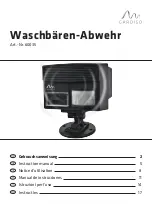
ZP3 Fire Control Panel Installation, Commissioning and Maintenance Manual
REV 11 (ISS 08/03/2010)
Page 97
New network filters
Filter description
Fetch disables control
This filter is used to indicate the other nodes in the system to which the "Fetch Disables" command may
be sent. This is used to control the "Disables" LED on the front of the ZP3 Panel. The LED only illuminates
on the local panel if the local panel has any disabled or delayed elements or if any remote panels to
which the "Fetch Disables" control may be sent have any disabled elements. If this filter is off to a remote
panel then any disabled elements on that panel are not displayed on the local panel.
Disable events
This filter specifies the remote panels to which the event telegrams arising out of a change of
disable status on the local panel should be sent. This filter should only be turned on if the remote
panel has a specific need to use this information other than for display purposes, for example if a
remote I/O mapped operation has to be triggered off a specific zone or device disablement on
the local panel. Display only purposes are provided for with the "Fetch Disables" control.
Note:
It is not a requirement to send disable events to Maestro (with P2P-3 protocol) since all disablements are sent
in the "General Status" message.
General status events
This filter is used to identify the Maestro nodes in a network. Panel nodes do not use the General
Status Block data, but all panel nodes generate the message. Setting the General Status Event
flag for each Maestro node permits the remote panels to always send the status messages to all
of the Maestros at the same time.
Since the disable events no longer need to be sent for display only needs, each panel volunteers
the General Status message to all the Maestros whenever a change of disable status occurs on
the panel. A 20 second delay period from the last change of disable status is used to allow
multiple disable changes to be done prior to the status message being sent out.
Note:
The delay is cumulative, i.e. a 20 second period of no changes is required before the status job is sent.
Sending a status request message from Maestro, which is processed immediately by the target panel, if it is
not currently busy with a status job, can shorten this period.
Use of network communications filters
Overview
We recommend that the available comms filters be used to minimize the network
communications data traffic of commands as well as events to those that are necessary. This is
done to optimize the use of the bandwidth and buffer sizes, which are limited by physical
constraints. The panel can buffer a total of 484 events, including points, zones, and system status.
Once this buffer is full, information is no longer passed to Maestro and panel events that are
inter-panel I/O mapped are not sent. In the case of viewing ‘Disables’ some of the buffer space
may be occupied by other events that occurred since the last reset, including reset status events
from remote panels, if they were configured to send them.
In particular the “Disabled/Enabled” status of points and zones is now passed to Maestro primarily
by
General Status data blocks
(controlled by the General Status Filter). They no longer depend on
the Disabled Event telegrams, which bypasses the restriction in event buffer size and contents.
















































